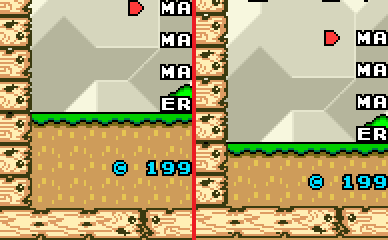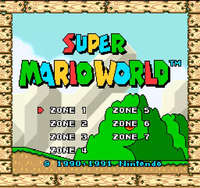バージョンの違い
このページはVersion_Differencesページの私製日本語訳です。日本語として自然で理解しやすいように言い回しを変えたり、一部の段落は再構成している部分もあるため、不正確な翻訳の可能性があります。また、テキストの強調は訳者によるものです。 yuniruyuni (talk) 19:17, 17 Jan 2023 (JST)
Working in Progress / 作業中...
このページではスーパーマリオワールドのバージョン間の違いを比較します。
Contents
バージョン
現状のリーダーボードで許可されているスーパーマリオワールドのバージョンは6つあります。
| 略称 | バージョン名 | Found |
|---|---|---|
| J | Japanese | 日本語テキストを用いている唯一のバージョン。日本国内向けにリリースされた。 |
| U | North American | NTSC環境利用者のためのローカライズバージョン。 |
| UW | North American All-Stars + World | スーパーマリオコレクションに同梱されていたバージョン。 |
| E0 | PAL v1.0 | PAL環境利用者のためのローカライズバージョン。ただし、PALの画面に合わせるための解像度変更が行われていない。 珍しい。 |
| E1 or E | PAL v1.1 | PALのアップデートバージョン。このバージョンでは画面上下から黒い帯が削除された。 |
| EW | PAL All-Stars + World | PALリージョン向けにスーパーマリオコレクションに同梱されていたバージョン。 |
バージョンの違い
| J | U | UW | E0 | E1 | EW | 注記 | |
|---|---|---|---|---|---|---|---|
| テキスト | 日本語 | 英語 | |||||
| オープニング | 自動 | 要操作 | オープニングを抜けるために、日本語バージョン以外ではボタンを押す必要があります。 | ||||
| セーブ用ウィンドウ | 小さい | 大きい | セーブ用ウィンドウのサイズは英語テキストに合わせて変更されたので、表示により多くの時間がかかる。 | ||||
| スイッチの宮殿でのファンファーレ | 短い | 長い | カットシーンのテキストを読みやすくするためにスイッチの宮殿のファンファーレの再生時間が変更されている。 | ||||
| L+R入力でお城に再入場できるか | できない | できる | |||||
| コースデザイン | リフトンを食べることができる | 細かなコースデザインの変更あり | 参照:バージョンの違い | ||||
| ゲームの挙動 | 本来の動作 | 変更された動作 | フレームレートの変更に合わせて、PAL環境でも実行が遅く見えないようにゲームの挙動が変更されている。 | ||||
| フレームレート | 60 Hz | 50 Hz | |||||
| 解像度 | 256x224 | 256x239 | E0バージョンは画面上下に黒い帯が表示されている。 | ||||
| コースクリア(Exit)の数 | >= 96 | 最大で*96 | >= *96 | 最大で *96 | 最大で青色の96 | >= *96 | JとAll-Starsバージョンでは、グリッチを使って追加のゴールをすることで、クリアカウントを96よりも大きくすることができる。 |
| ルイージ | マリオのパレット変更版 | 独立したグラフィックデータ | マリオのパレット変更版 | 独立したグラフィックデータ | |||
| ゲームの終了 | できない | マップでセレクトを押す | できない | マップでセレクトを押す | |||
Releases
Super Mario World has been released on 6 systems, but not every version is available on every system. Here is a chart that shows which versions exists on each system.
| J | U | UW | E0 | E1 | EW | |
|---|---|---|---|---|---|---|
| Super Nintendo | ✓ | ✓ | ✓ | ✓ | ✓ | ✓ |
| Wii VC | ✓ | ✓ | ✓ | |||
| 3DS VC | ✓ | ✓ | * | |||
| WiiU VC | ✓ | ✓ | * | |||
| SNES Classic | ✓ | ✓ | * | |||
| Nintendo Switch Online | ✓ | ✓ |
* While PAL 3DS, WiiU, and SNES Classic releases exist, they are actually the U version, since the 50 Hz versions are of no use anymore.
How to Tell Which Version You are Playing
If you aren't sure which version your game is, just follow this questionaire.
- Is the text in Japanese?
- Yes - J version
- No - continue...
- What system are you playing on?
- 3DS VC, WiiU VC, SNES Classic, or Nintendo Switch Online - U version
- Super NES, Wii VC, or any unofficial method of playing the game - continue...
- Are you playing a version of All-Stars + World?
- No - go to 5.
- Yes - continue...
- When the title screen shows, does the ground take up 2 or 3 logs vertically? (see right)
- 3 - EW version
- 2 - UW version
- When the title screen shows, does the ground take up 2 or 3 logs vertically? (see right)
- 3 - E1 version
- 2 on Wii VC - U version
- 2 on Super NES - continue...
- Go to Yoshi's Island 1 and hold run and right as the level loads. What happens?
- Mario hits the Koopa and dies - U version
- Mario runs under the Koopa and survives - E0 version
PAL vs NTSC
To compensate for the PAL system that runs at 50fps opposed to 60fps - developers made Mario run faster in the PAL rom to offset the difference. As a result Mario can make jumps that are not possible in the NTSC version, so different routes would be taken. It is difficult to compare runs between these two versions. Even though Mario's running speed was increased to make up for the slower framerate, other parts of the game like cutscenes and the overworld were not sped up, so generally runs on PAL versions will be much slower because of this.
This video demonstrates some of the speed differences between PAL and NTSC versions of the game:
J Version Advantages
- J version is 0.267 seconds faster for each save message.
- J version is 3.2 seconds faster for each switch palace.
Taking into account these differences this is how it affects some main categories:
| Category | J is faster by |
|---|---|
| 11 Exit | 0.534 seconds |
| No Starworld | 2.670 seconds |
| All Castles | 3.204 seconds |
| 96 Exit | 20.810 seconds |
Level Differences
- The message at the end of Funky reads "YOU ARE SUPER PLAYER!!" on the J version instead of "YOU ARE A SUPER PLAYER!!" like the other versions.
- There is no yellow ! block at the beginning of Donut Plains 2 in the J version.
- There is visible cut-off on the J version on the right side of Donut Secret House if you scroll the screen to the right.
- The time limit was changed to 400 seconds from 300 seconds in the J version of Lemmy's Castle.
- There are fewer arrow signs at the end of Chocolate Island 3 in the J version.
- The 3 extra lives below the orb in Sunken Ghost Ship are not present in the J version.
- There are fewer green berries in Funky in the J version.
- There is no cape near the beginning of Vanilla Dome 1 in the J version.
Nintendo Super System
There is a relatively little known arcade release of Super Mario World for the Nintendo Super System. Released only in the US, the Nintendo Super System is essentially a Super Nintendo in an arcade cabinet. This version can be differentiated from all others by the title screen (shown right). The Nintendo Super System version of the game is identical in physics and in all levels to the U version of the game, except that the message box in Yoshi's Island 4 is no longer present (because Start+Select is disabled). Most glitches also function identically.
There are several changes which make this version technically the fastest official release of Super Mario World. For one, the game does not save, so save prompts never appear. The intro cutscene can be skipped immediately after the message box text appears. Castle cutscenes can be scrolled by the player by mashing, drastically reducing their length. Finally, the player may choose to start in any one of the seven "zones", with previous levels already completed. The only change which could adversely affect speedruns is that Start+Select is disabled. Overall, this version would save several minutes compared to the versions above in a 96 exit run.
For the leaderboards, this version is not currently allowed. This version can be run on a standard SNES (or emulator) through a flashcart, but obtaining a legitimate copy is prohibitively expensive. Additionally, only a very small number of such units were produced, while all the above versions have millions of sales. Finally, because of the massive time savings, allowing this version would essentially invalidate all historic runs.

